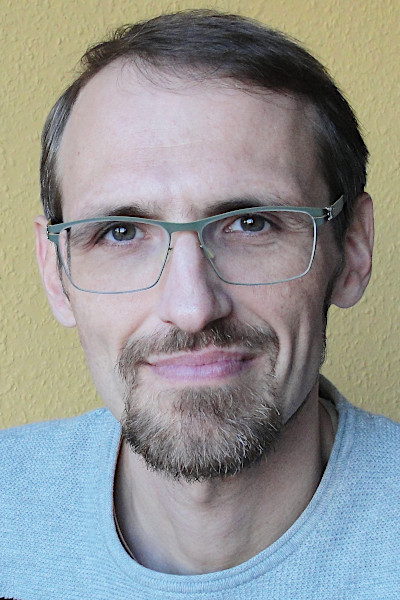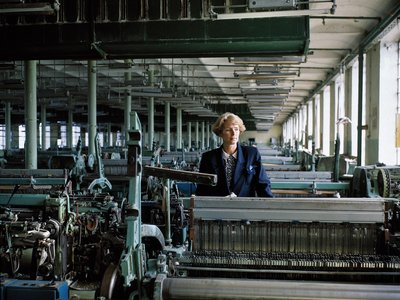Florian Peters is a historian specialising in Central and Eastern European history based at Friedrich Schiller University Jena. His research interests revolve around the question how modern societies made sense of major political, economic and social change. After graduating from Christian Albrechts University Kiel, he received his Ph.D. from Humboldt University Berlin for an award-winning thesis devoted to Holocaust memory and the politics of history in Poland. Before joining SFB 294 in 2021, he held researching and teaching positions at the Leibniz Institute for Contemporary History Munich–Berlin and at European University Viadrina Frankfurt (Oder). With his track record as a transdisciplinary and transnationally oriented historian, he contributes to the SFB’s research mission by exploring the transformations of the property regimes in post-socialist Poland and Ukraine.
Research Project
Take your destiny into your own hands. Privatisation and municipal self-government in post-socialist Eastern Europe
The SFB’s research project B07 addresses the most profound change in property regimes in recent European history: the privatisation of the formerly state-socialist economies in Central and Eastern Europe since 1989. My research has been focusing on post-socialist Poland in the first place. It is based on a set of local case studies investigating the conflicts over the (re-)establishment of private and municipal property.
The institutionalisation of local self-government in Poland in 1990 drew heavily on notions of economic self-governance promoted by the unprecedented social movement of Solidarity in 1980–81. Hence, it was somewhat at odds with the neoliberal macro-economic shock therapy introduced at the same time. By analysing the contradictions and struggles arousing from this tension, the project adds a historically informed perspective to ongoing debates on the results of post-socialist transformations. Moreover, it aspires to provide historical reflection for recent re-evaluations of communal property.
In the second funding phase, I am complementing my findings from Poland by developing a comparative perspective on debates and conflicts over privatisation in Ukraine. This research is guided by the assumption that the relative weakness of state and civil society institutions in post-Soviet Ukraine facilitated a social paternalistic transformation path dominated by local and regional elite networks.
Activities
Recent Publications
Current academic publications
-
Peters, Florian (2025c): „Between Self-management and Authoritarianism. Polish Paths to Neoliberalism“, in: Tobias Rupprecht (ed.): Peripheral Liberalism. Market Economists and the Liberal Script Outside the West, London: Routledge, pp. 101-116, Open Access: https://doi.org/10.4324/9781003689287-10.
-
Peters, Florian (2025b): „“Small Group, Big Business”: Imagining Capitalism and Capitalists in Late Socialist Poland", in: Agnes Arndt / Kerstin Maria Pahl (eds.): Capitalist Cold. On Callousness and Other Economic Emotions in Europe and the United States, London: Routledge, pp. 179–203, Open Access: https://doi.org/10.4324/9781003351955-11.
-
Peters, Florian (2025a): „“They all talk about free market, but…” Concepts of Ownership Transformation and Privatization in Post-Socialist Poland and East-Central Europe“, in: Martin Schulze Wessel / Darina Volf (eds.): Changing Times, Persisting Legacies. The Uneven Development of East-Central Europe since 1989, Göttingen: Vandenhoeck & Ruprecht 2025, pp. 89–111.
-
Peters, Florian (2024c): „Zweierlei Wiederaneignung der postsozialistischen Stadt. Kommunale Selbstverwaltung und Privatisierung in Polen in den 1990er-Jahren“, in: Berliner Journal für Soziologie, 34 (2024), H. 4, S. 489–513, Open Access: https://doi.org/10.1007/s11609-024-00540-5.
-
Peters, Florian (2024b): „Old Walls Crumble, New Barriers Appear. Polish Perspectives on German Reunification and European Integration“, in: Kiran Klaus Patel (Hrsg.): Tangled Transformations. Unifying Germany and Integrating Europe, 1985–1995, Toronto: University of Toronto Press 2024, 56–82.
-
Peters, Florian (2024a): „Shock Therapy Mythologies. Contested Memories of Poland’s Balcerowicz Plan“, in: Wawrzyniak, J.; Pehe, V. (Hrsg.): Remembering the Neoliberal Turn. Economic Change and Collective Memory in Eastern Europe after 1989, London: Routledge, 22–38.
-
Peters, Florian (2023a): Von Solidarność zur Schocktherapie. Wie der Kapitalismus nach Polen kam, Berlin: Ch. Links.
-
Peters, Florian (2023b): „Inflation und Schocktherapie. Polnische Transformationserfahrungen“, in: Mittelweg 36, Nr. 6/2023, 108–126.
-
Peters, Florian (2023c): „Neoliberal Takeover? How the Social History of Economic Ideas Contributes to Historicising Post-socialist Transformations“, in: Forum Historiae 17 (2023), Nr. 2, 58–69. DOI: 10.31577/forhist.2023.17.2.5.
Download the complete list of publications.
Media and Podcasts
- Property rights versus tenants: Interview with Beata Siemieniako on the restitution of housing in Poland. Podcast episode for “Urban Political” and “appropriate”, 30.11.2023.
- “Die Ukraine, die Ambivalenzen des Nationalismus und wir.” Essay for Zeitgeschichte-online, 27.11.2023.
- “Die 'Neue Ostpolitik' - Neubewertung nach dem Angriff auf die Ukraine?”, Redaktionspodcast “Vergangenheitsformen” by H-Soz-Kult, 31.Oktober 2023, available online via H-Soz-Kult.
- Interview by Prof. Dr. Felix Wemheuer on the book: “Von Solidarność zur Schocktherapie. Wie der Kapitalismus nach Polen kam.” available online via Youtube.
Lectures (selection)
-
„(Neo)liberals against property claims: Contentious privatisation and protracted restitution in post-socialist Poland”, Lecture as part of the conference “Dynamics of Property Change in Eastern Europe”, German Association for East European Studies / Martin-Opitz-Bibliothek, Herne, October 16, 2025.
-
„Interim capitalism from below: Informal markets and the shifting of economic imaginaries in late and post-socialist Poland”, Paper presentation at the XI World Congress of the International Council for Central and East European Studies, University College London, July 21, 2025.
-
„Radikale Schocktherapie, behutsame Privatisierung: Polens Weg in den postsozialistischen Kapitalismus“, Lecture at the research center Transformationsgeschichte, Universität Leipzig, July 14, 2025.
-
„‘Alle reden vom freien Markt, aber…’ Zur Historisierung der neoliberalen Transformation in Ostmitteleuropa nach 1989“, Lecture as part of the workshop „‘Neoliberalismus’ als Deutungsparadigma der neuesten Zeitgeschichte“, Institut für Zeitgeschichte München, April 29, 2025.
-
“Communist direct democracy vs. liberal shock therapy: IMF-style "structural adjustment" and democracy in Poland”, Presentation on the conference “The Bretton Woods Twins and Structural Adjustment Programs in the Era of Neoliberal Globalization”, Corvinus University of Budapest, September 28, 2024.
- Book talks on "Von Solidarność zur Schocktherapie" at the universities of Warsaw, Cologne, Vienna, Tübingen and Heidelberg.
- "New Borders after the Fall of the Wall: Polish Perspectives on Europe and the West after 1989", Contribution to the 12th European History Forum "When does contemporary history begin? The historical-scientific examination of the 1990s in Eastern and Southeast Europe", Heinrich-Böll-Stiftung, Berlin, May 22, 2024.
- "Seit’ an Seit’ und doch getrennt. Die schwierige polnisch-ukrainische Nachbarschaft während des Staatssozialismus", Lecture at the 6th Congress on Polish Studies, Dresden, March 16, 2024.
- "German-Polish relations in the context of 1989/90 and the reunification of Germany", Statement on the panel "Geopolitics of memory in contemporary German-Polish relations“, University of Cambridge, March 5, 2024.
Teaching
- BA-Seminar „Migration in modern Polish and East Central European history“ (WiSe 2020/21) (Europa-Universität Viadrina Frankfurt/ Oder)
- MA-Seminar „Rechtsterroristische Attentate der Zwischenkriegszeit in Deutschland und Polen: Rathenau – Narutowicz – Pieracki“ (WiSe 2020/21) (Europa-Universität Viadrina Frankfurt/ Oder)
- BA-Seminar „Age of Transformation: Economic and Social Change in East Central Europe after 1989“ (SoSe 2020) (Europa-Universität Viadrina Frankfurt/ Oder)
- MA-Seminar: „Spearheads of ‚Civil Society‘? Dissent and Opposition in Poland and East Central Europe in the 1970s and 1980s“ (SoSe 2020) (Europa-Universität Viadrina Frankfurt/ Oder)
- Übung mit Exkursion nach Warschau: „Zwischen Krieg und Erinnerung. Warschau im Zweiten Weltkrieg“ (mit Kerstin Bischl, WiSe 2013/14) (HU Berlin)
- Übung: „Kriegsherrschaft und Erinnerung. Ostpolen unter deutscher und sowjetischer Besatzung 1939-1945“ (mit Christian Meier, SoSe 2011) (HU Berlin)

